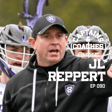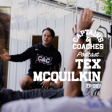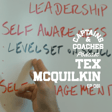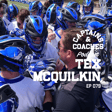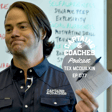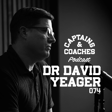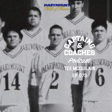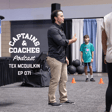Introduction and Importance of Max Lift Percentages
00:00:00
Speaker
Just stick with your basic periodization of sets and reps based off of your percentages. Know that roughly 100% is your one rep max. 90 is three.
00:00:11
Speaker
Yes, I know it can be three to four. Any strength coach that want to argue with me, that's fine. 80%, yes. You could say it's anywhere between eight and 10. Let's err on the side of caution. Let's call it 80%. And then from there, if you want to start to break the rules, learn how to break the rules once you know what the rules are.
Captains and Coaches Podcast Overview
00:00:27
Speaker
Welcome to the Captains and Coaches podcast. We explore the art and the science of leadership through the lens of athletics and beyond. I'm your host, Tex McQuilk, and this episode is recorded live from the and NSCA National Conference Exhibit Hall in Kansas City.
00:00:39
Speaker
Today, we're sitting down with Justin Lima, the CEO and president of the Strength Coach Network, for a wide-ranging conversation about coaching philosophy, career development, and the evolving landscape of strength and conditioning.
Interview with Justin Lima: Coaching Philosophy and Career Development
00:00:53
Speaker
We'll explore how Justin is taking the Strength Coach Network to new heights by providing accessible, high-quality education through webinars and courses that are taught by the best coaches in the business who are working with elite athletes.
00:01:07
Speaker
But this show isn't just about theory. Justin brings practical wisdom from his time at Iowa and Towson, discussing everything from using the Reactive Strength Index to monitor fatigue, to having honest conversations with athletes about their potential, and... My favorite and most of my questions here about the art of working with sport coaches instead of against them With that, let's kick it off to Justin who helps us raise the game. Ready, ready and crazy.
00:01:35
Speaker
We're live. You want to stand, we sit, you can do whatever. Establish you are bigger than I, a Division one starting offensive lineman.
00:01:49
Speaker
No, I played Division III football. Oh. Division III. Which school? So I went to Bridgewater State University. It was Bridgewater State College back. I went there 2005, finished playing in 2008, graduated in 2009, got my master's in 2011.
00:02:03
Speaker
All right. Well, sweet.
Mission and Offerings of Strength Coach Network
00:02:05
Speaker
Yeah, I was 2008 as well and then did master's in 2010. ah But D3 lacrosse, we didn't even have football, so we were the big men on campus. Okay.
00:02:15
Speaker
I had a great time. There you go Well, but rolling right into it, sitting down with Justin Lima at the NSCA conference. We're in the vendor village. What do we call this? Reception hall? The exhibit hall, yeah. The exhibit hall.
00:02:28
Speaker
And there's presentations going on while we speak so I can see. I don't know what's going on over there. Dr. Brian Mann's being mentioned on a slide.
00:02:40
Speaker
But all right. So you're here, Strength Coach Network. You've got a booth. You've got a mission. So I was a fan of the the early days of the Strength Coach Network, and then you're taking over as CEO and president, and I love the direction you're taking it. Thank you and the very visual representations you got on Instagram, so it's a must follow.
00:03:01
Speaker
And then you're taking what you see in weight rooms where people are highlighting on their social media. This is one aspect that you're doing well.
Role of Social Media and Coaching Precision
00:03:08
Speaker
And then you're asking questions, questions that they need to be asked and they need to answer, in my opinion.
00:03:16
Speaker
Do you ever get an answer from the guys that you're No, I've never gotten an answer. And so what he you know what we're talking about here is there will be things that get put out on social media and it's like, oh, look at what's going on. And I don't think I'm ever going to change the opinion of the person that posts something that's wrong. i've met like Even with the Joel Seidman thing where he talked and went after Ben Bruno and then tried to do the backstroke and be like, oh, I wasn't trying to come after you, Ben. No.
00:03:42
Speaker
When I put out that video on YouTube about how Joel Seidman and I went line by line on the seven things that he said and how it was wrong, or when there'll be coaches that post these atrocious videos that are negligent and scary, it comes from multiple places. One, if my son was ever an athlete at those schools, I don't want them doing those dangerous things where they could get hurt.
00:04:02
Speaker
Second of all, I want to educate those in the middle, those that are like, oh, hey, maybe this is right. I have to find a way to try to push back and that's why I'll leave comments, I'll make these videos and try to get other coaches to view it to be like, oh wait a minute, I shouldn't do these bad, egregious things because we should do our due diligence and give athletes good training programs and give coaches a good product.
00:04:31
Speaker
here And what what do you feel is is the trap? So that sticking with the coach who's in the middle or they're a sport coach that's leading the strength for their respective high school or lower level college, what do you feel the the trap is? Like it looks sexy, they're they're moving fast, or that athlete is a professional that the coach is working with.
00:04:51
Speaker
What are some common traps that middle-of-the-road coaches fall into? that they want to go then apply it and then misapply the misapplication. The random word hard, everybody, oh, well, it's hard or it looks tough and it looks difficult. And it's like, all right, you know what else is hard? Like, there's so many random, it's hard to go tread water for an hour. That doesn't mean you should do it.
00:05:11
Speaker
Or coaches will say there's many roads that lead to Rome. Okay, there's many roads that led you to here at the NSCA Coaches Conference. Did you take the slowest, most painful? Did you walk here while you carried your luggage? No, you could have.
00:05:25
Speaker
That road would have led here, but you didn't do it. Or there's many ways to skin a cat. Sure, you could use a spoon. I could use this, and it would be painful, and it wouldn't be effective. So why do we not treat strength conditioning the same way with let's be obsessed with finding the best way to do things. Mike Boyle had a great quote.
00:05:43
Speaker
He's like, I obviously think that the way that I do it is the best. Every strength coach should think that their way is the best. Because if you're not doing the best, why are you doing it?
Journey to Strength Coaching and Collaboration with Sport Coaches
00:05:52
Speaker
If I have an opinion that needs to get changed over time, I change my opinion over time. Kind of like what Mike Boyle has said before too. so Getting back to your original question, coaches get caught in this trap of, oh, well, it's hard, and oh, it looks difficult, and oh, we're we're grinding. And it's like you're not doing the appropriate thing. It is not the most appropriate way to train an athlete for the sport that they have.
00:06:15
Speaker
Stop just throwing darts at the wall. Be the precision sniper instead of just shotgun blast. Mm-hmm. Yeah, and then share the mission of the Strength Coach Network and then the massive catalog of information that you you guys present and then offer to coaches.
00:06:33
Speaker
And then what's the path in to receive all this amazing information? So our Strength Coach Network, we are where strength coaches continue their education. you You know, we're here at the NSCA right now and there's a lot of students here. And a lot of students when they're in college,
00:06:48
Speaker
once they graduate and coach Brzeesh Patel, he's the one that kind of said this best. He's like, a lot of the continuing ed is maybe sometimes made for younger strength coaches. It's not always for older strength coaches.
00:06:58
Speaker
Our content is for younger strength coaches all the way up to your senior high-performance director. As we have presentations from high-performance directors themselves, we have coaches that have worked with the highest-level athletes, the athlete that has set the world record in the 400-meter field Dash at the 2016 Olympics, his strength coach presented inside Strength Coach Network.
00:07:20
Speaker
like So that is the high-level education that we have. um So the vision statement is we are where strength coaches come to continue their education. And how we do it, our mission statement is providing webinars, courses that are taught by coaches that work with athletes.
00:07:34
Speaker
And our presentations also help coaches earn CEUs. So right now it's the middle of July. Some coaches are still working with athletes. they can't come here because they don't have time. Some coaches can't come here because they don't have the budget for it. So we're able to solve both problems where if you don't have the money, if you don't have the time, or if you don't have both, you can get an annual membership with us. You can get a CEU course that comes with that annual membership, or you can just purchase our courses that have CEUs as well.
00:07:59
Speaker
right So that's that's a high overview of what we're doing. We've got 180 webinars on every single topic. You talk about Brian Mann. Brian Mann's got about... four presentations inside Strength Coach Network.
00:08:11
Speaker
He's done at least 10 of the different modules between Fundamentals 1 and Fundamentals 2. Charlie Weingroff, who presented yesterday, he's got two presentations inside Strength Coach Network. I already said Dr. Brian Mann.
00:08:23
Speaker
Dan Paff is presented inside. We've got Buddy Morris inside. ah Zach Daykant. The list goes on and on of coaches that have worked. You name the profession. Rugby, baseball, lacrosse, swimming.
00:08:35
Speaker
The coach who presented on training the swimming athlete was a former swimmer who is now a strength conditioning coach for swimming athletes. I'm not the expert in every single sport, but I know enough about field hockey to learn it.
00:08:48
Speaker
But then I also know go get somebody to present on field hockey who also happened to have won a bronze medal with with Germany and is the head strength coach for the German national team.
Managing Training Load and Athlete Monitoring Technologies
00:09:01
Speaker
They're doing something right over there. Exactly. You mentioned the athlete that then turned to coach. I do want to spend time with that because your career started as a sport coach.
00:09:12
Speaker
And then you got the opportunity or took the opportunity to then transition to the weight room. So I had a similar experience, a graduate assistant coach. took over the strength responsibilities because we didn't have that coach, we didn't have that position and knew we needed it.
00:09:26
Speaker
And I value that because I was able to use the sport to then teach these dudes, lacrosse players, D3 guys from East Coast who didn't lift weights like we did in high school football and utilize sport to then communicate the weight room and then vice versa. was a defensive coach.
00:09:43
Speaker
Squat comes into ah field work a lot. So share with us this experience in your education from transitioning from sport coach to then strength coach and then working with those sport coaches.
00:09:57
Speaker
Yeah, so to just backtrack it all, I got my undergraduate in criminal justice. So I had no idea. Like, anybody that's listening, if you're a young strength coach and you don't know what you want to do or you're young and you're hearing this, like, I was there. I had no clue. I went to college just to be with my three friends to go play football.
00:10:13
Speaker
I was the worst of them, but it was the four All same school? All the same high school. We went to the same college. Nice. And I just went and followed my best friend and my two other friends from high school. And I was like, sure. You know, my best friend wanted to be a police officer. i was like, I'll do that. Sounds good. Had no idea of what I wanted to do with life.
00:10:31
Speaker
um Fast forward, I wind up being the best of the four of them in college. I was a captain. Only one was a captain out of that group of us. And so I signed up to go to grad school for criminal justice because I was essentially just kicking the can down the road. I didn't want to grow up yet or get a real job. So i was like, I'll go to grad school.
00:10:49
Speaker
And in my final semester, so spring semester of 2009, my offensive line coach was like, hey, will you coach the O-line with me? Like, I don't want to coach without you. You were kind of a coach on the field. It's a big group.
00:11:01
Speaker
It's like, yeah, sure. I'm not ready to grow up. And I'm going to be in town taking grad school classes. Let's do this. In that summer, summer of 2009, I was working at the DA's office as an intern, but they gave me like a job. I had a cubicle. I was sitting in court with a lawyer. like What? I was doing... ah We were a juvenile diversion program. So like if a young...
00:11:24
Speaker
16-year-old kid got caught up on like ah you know possession of alcohol or shooting off fireworks on the 4th of July and they got in trouble for it, we would get them a continuance without a finding if they would just go into our diversion program, give them community service.
00:11:39
Speaker
So way it never went on their record. So I'm calling parents. like I'm doing real things.
Data-Driven Coaching and Athlete Communication
00:11:44
Speaker
And at lunchtime, I'm like this is like um'm looking around. The lawyers are kind of miserable. Everybody's miserable. i'm like, well, this is...
00:11:50
Speaker
I kind of just had that in the back of my mind. Like, that that seemed weird. I don't want to do that. Fall of 2009, I'm coaching. I'm in grad school, and I was working on my offensive line coach's gym.
00:12:02
Speaker
So he owned a gym. It was a powerlifting gym. it was a private sector gym that trained athletes as well. I used to go train there when I played football. And I'm working at his front desk. I'm loving what I'm doing. I can't stop thinking about football as I'm coaching it.
00:12:14
Speaker
And I'm in grad school classes, and I'm only answering the teacher's question because I feel bad for them that nobody else is answering. like The teacher's like, hey, what was da-da-da-da-da? And was really quiet. I'm like, I can't do this. I'll answer your question for you.
00:12:27
Speaker
But again, I'm just like, I'm feeling these nudges, right? Like, this isn't for me. We lose to a team called Salve Regina, which you never lose to Salve where I'm from. Like, you just beat, ah we I was 4-0 against them. You don't lose to Salve.
00:12:39
Speaker
We lose to them. i go out and get dinner with a former colleague of mine, Mike Siriano, who was a head strength coach. He was at URI. That's where I interned for a little bit with him. He's been, he was a head strength coach at Louisville. He was at um Oh my gosh, before they left Louisville, he was at App State. So he's been around the block for a while.
00:12:58
Speaker
And he's like, you know you can get into this strength and conditioning thing. I'm like, what are you talking about? I research it. I can go to, you know, grad school at Bridgewater. So once I realize it, I'm like, right I withdraw from grad school classes in criminal justice.
00:13:11
Speaker
I work full time at Coach Moyen's gym. And then I start grad school in January of 2010. So like, that's where it, and I say all of this because it just leads into the fact of, okay, I was already like being a position coach is kind of what got me to learn that I could be a strength coach.
00:13:29
Speaker
Well, I learned about strength and conditioning because I got bigger, faster, stronger from him. I was not very big in high school. I was kind of, I was 225, 6'2", 6'3", like, but then I played as a true freshman in college.
00:13:42
Speaker
Bigger, faster, stronger. I get up to 300 pounds my senior year. And it's from just training with him, eating, doing the right things. And that that kind of just helped me fall in love with it. So 2010, I'm in grad school for criminal justice, or excuse me, grad school for strength and conditioning.
00:13:56
Speaker
Working with him, i get to be the tight ends coach as well as the assistant line coach. Push comes to shove, I have to start to pick one, strength conditioning or, you know, and I didn't like recruiting, calling kids. And I love the weight room aspect of it. So that's kind of what slid me that way.
00:14:11
Speaker
Yeah, and then the – but now you still continue to target sport coaches because a lot of high school level strength responsibilities are the low man on the totem pole's job, unfortunately.
00:14:25
Speaker
So they they come in with passion. They come in with – ah limited knowledge based off their experience. Usually it's the, hey, I did this program in college, we're going to do it in high school because it worked for me at college.
00:14:38
Speaker
So now hit speaking specifically to that group, what's the what's the guidance, what's the traps to avoid? Are you still asking them to do 1RMs and percentage-based programs?
00:14:50
Speaker
like What would be your guidance for that group? Low man on the totem pole who's still passionate and hasn't yet been defeated at the high school level. So I would say too is like as a strength coach, make sure you can talk the language. like you don't You don't go up to ah a Spanish person, a Mexican, a Chinese person, somebody that speaks a different German, Italian.
00:15:09
Speaker
You don't walk up to them and expect them to speak English without trying to learn their language. you need to do this same exact thing with your sport coaches. So for me, football was easy because I played it. But I had to learn the nuances of, because I played O-line, I need to learn, OK, how do tackles talk, how do linebackers talk, safeties, DB. like You might think that there's no big difference between safety and defensive back.
00:15:32
Speaker
Well, I had Jason and Devin McCourty, the twins that played in the NFL for the Patriots and the Browns. and theyre like Yeah, Super Bowl and MVP. Devin was not a Super Bowl MVP, but he's a three-time Super Bowl champ. Jason won a Super Bowl. Yeah.
00:15:44
Speaker
And so, like, the McCourty twins, they're on NFL Network. And so I had them on the show because their strength coach was friend of mine, Mike Wadango. And I'm bringing all of this up to say jason mccor or Devin McCourty was playing corner, and then they moved him to safety, and then they moved him back to safety. And to the naked eye, it's like, yeah, who cares? It's DB.
00:16:04
Speaker
It's a huge difference whether you're covering somebody in space as a safety, your so you know, support over the top versus cornerback. You're one-on-one alone. yeah So you have to learn how to speak that language. And so if you're working with – Swim and dive. You have to learn the languages of what a distance day looks like and what a sprint day looks like. And if you're working with field hockey, learn their learn their language so you can speak to them and get them to care about what you do by teaching them that you care about what they do.
00:16:30
Speaker
So that's the first thing to start with. Then that strength coach, yeah, I would say percentages. The first thing you need to do, go look up APR, not APRE, go look up proliferance chart so you can kind of understand like, hey, 80% is roughly eight rep max.
00:16:44
Speaker
And then from there, if you need to dive into the nuances of like, OK, yeah, 80% is roughly your eight rep max. But if you're in season and you have a ton of fatigue, it's probably closer to, you know, your five rep max because you're so tired. Right. So understand.
00:16:59
Speaker
the general rules before you have to break the rules. And so reading some of the seminal texts, I mean, i you know, like you could read the essentials book. It might be a little bit higher level and harder for you to understand. um So getting in, reading Boyle's advances of functional training, that's a really good book just to kind of lay the foundation, then read essentials to understand it. But Just stick with your basic periodization of sets and reps based off of your percentages.
00:17:25
Speaker
Know that roughly 100% is your one rep max. 90 is three. Yes, I know it can be three to four. Any strength coach that want to argue with me, that's fine. 80%, yes. You could say it's anywhere between eight and 10.
00:17:37
Speaker
Let's err on the side of caution. Let's call it 80%. And then from there, if you want to start to break the rules, learn how to break the rules once you know what the rules are.
Old Bull Training Program and Athlete Assessment Methods
00:17:46
Speaker
Time out. Let's take a second to talk about training and introducing you to the old bull training program.
00:17:52
Speaker
This is the program that I'm following and writing for myself because i was bored and beat up with other training programs out there. Now I focus in on fun and a very time effective and efficient training program. It also targets different joint issues that I'm having, shoulders, hips, back, knees, ankles, everything from my athletic playing career and then career as a strength and conditioning coach, lifting every single day. My body's beat up as I approach 40. This program is focused on building it back up in a very time-effective and efficient manner. I encourage you to check out the program. The most fun you'll have throughout the week and how I'm structuring the program and giving you the opportunity to choose your own adventure each day.
00:18:40
Speaker
For seven-day free trial, click the link in the show notes, check out the program, and join me on Old Bull. And now, back to the show. Ready, ready, and break. Yeah, I like that. Yeah, I usually work within rep max models.
00:18:53
Speaker
So if I want that percentage, then I would program the five rep max. Because sometimes you get kids that are different kids than they were the month before or two months before. They hit the spurts.
00:19:05
Speaker
So then... Intramuscular coordination explodes. And they just get bigger, like if their muscle fibers get bigger, penation angles, whatever. Yeah. And that's where if you want to get into the, like if you're getting to the weeds of it, like yeah, sure, you go can go and now that's why I love having Vitruve VBT because I got a girl Ava, who's coming for me from Simpson College, shout out to Coach Sam Schmitz and what he does at Simpson.
00:19:26
Speaker
Like, now I've got Ava who's coming into me and it's like, okay, I understand that the research says, you know, roughly this percentage is this meters per second, but I'm a grinder. So, like, I can get that, you know, squat. Some people will say you can't get a rep. Like, you're going to fail around.3 meters.
00:19:43
Speaker
0.30, like I'm getting 0.2s. So it's like, I want to learn what Ava's one rep max is. And then I can program things instead of just being off of the percentages. I can be like, right, Ava, we're going to be working at, want to see this bar moving at 0.5 meters per second. So if if it's moving faster, I'm adding more weight and it's not just based off of the percentage because for her,
00:20:05
Speaker
I'm trying to balance the stimulus of, okay, she needs to play soccer to get better at soccer. She's in these soccer leagues, so she's got games on Monday night. Sometimes she's got two in a row. She's got practice on Tuesday, Thursday.
00:20:16
Speaker
She's off Friday and Wednesday. So how can I make sure that I'm giving her the most – potent dose possible, but I'm only doing this with this college athlete because she understands it, yeah right? And she's more highly trained. I don't need to be using my Vitruv unit with the middle schoolers that I'm training earlier in the day, or even the the high school athlete who's so young, it's like, cool, you're sore.
00:20:39
Speaker
That's okay. We're going to keep pushing because you can keep handling more and more. um But that's, I think once you have an athlete that you know and trust, because also credit to Ava, she's not off going and you know getting drunk and and not taking care of her body. She's coming in rested and the only stress that I have to handle is you know if she's stressed out from playing a game that was late, practice being late, or an exam that she was studying for. yeah So that way, and within that world, because I can trust her, sure, if her her if her Vitruv unit is showing that she's moving the bar a little bit slower and you know I know for her she's going to fail right around 0.3 on a bench press because she's not great at it, well, now I know I can shut her down before we get there, but I can program better sets and reps based off of VBT.
00:21:26
Speaker
But to that high school strength coach that's doing a lot of things, maybe you don't need to get into that right away. Just start with your general percentages. Once you understand that, then allow that technology to help you.
00:21:37
Speaker
Because at the end of the day, we work with human beings, not technology, not barbells, not any of that. Get the athlete to buy in like you, trust you, not just feel like, oh, I'm delegating the technology to train you. Yeah.
Strength Coach Network Resources and RSI Usage
00:21:48
Speaker
So some jumping off points from there, building off EQ, what's your check in with Ava? what are you looking for? Body language, are you asking questions? Speed, you mentioned was a check-in, but it's not the only check-in.
00:22:03
Speaker
Just the minute, like, hey, coming in, what is her body language the minute she walks in? Or the minute athlete, like if you're not working with athletes one-on-one, yeah, it's body language. Body language when how the group comes in, and then chattiness.
00:22:15
Speaker
If they're chatty, and they're talking a lot, and they're making jokes, chant they're refreshed, right? But if you're coming in and the team's quiet, they're probably pretty fatigued because they're not talking and they're not making jokes and they're not giddy.
00:22:29
Speaker
So if your athletes are joking around and messing around, they're probably pretty fresh. So that would be to the athletes coaches that are working with a lot of athletes. When I'm coming in and it's with Ava, we're always I always start my athletes when I'm working with them one-on-one and I recommend...
00:22:43
Speaker
When I'm in the group setting, we're rolling the bottom of your feet with a lacrosse ball. We're taking care of and um calf soft tissue work by putting our foot in the back of a kettlebell, and then we're doing some ankle mobility on a slant board. And that's where the conversation starts. Hey, how was the rest of your day?
00:22:59
Speaker
how wasn't it And just asking questions and then listening to the words and how she's responding. What are the words? What's the passion coming out of her voice? Does she sound tired? um Understanding that, you know knowing that she's also She does nannying. And just know the things in your athlete's life to ask the questions about. See how they respond.
00:23:17
Speaker
See how they're moving in the very beginning parts of your warm-up. And that'll give you your feedback. We also will do certain movements where we'll do a medicine ball throw, either bilateral split stance or single leg every day. Hey, how's the ball moving off of this? How does her um stolen completely or utilized from Gary Gray, the jo jump matrix. So jump off two feet, land on one.
00:23:39
Speaker
So it's a jump to a hop, because you take off two, land on one. We do that every day with her. We go forward, we'll go from two to one backwards, we go from two to one lateral, two to one opposite lateral. We do rotational work, just checking in. How does it look? Is she sinking her hips?
00:23:55
Speaker
Because we have those few check-ins along the way, that allows me to kind of see before we get going, we'll hit some version of an A cell or a max velo, and I can compare that to what we used because I'll just use my same exact units, or excuse me, same timing system.
00:24:10
Speaker
So anybody that might have multiple systems compare apples to apples. Like I won't compare her, I only have timed her on my Dasher Silvers. I won't ask her to run something on the Blues just because I don't want inter, there's already inter, inter,
00:24:26
Speaker
user reliability issues, so I just want to make sure that there's no device differences. um So I'll have that as a check-in. Again, how does that bar move if she's doing her power complex with an RDL or a deadlift or her squat or her bench press to be able to gauge how she's moving. Yeah.
00:24:43
Speaker
And then, You've had experience leading programs with Towson football. So now take that same check in but I got to manage 100 dudes. So what are some tools that you're looking for to manage and check in over that span of 100 So what we did is we would use drop jump.
00:25:02
Speaker
yeah And so that was our our measurement for RSI, just because RSI was what I did my dissertation on. So for those that don't know, reactive strength index, and the easiest way to measure it is with a drop jump. You could call it a depth jump too. Depth, for all those that really want to dive into the nitty gritty, it's the difference of 250 milliseconds versus everything else. So your drop jump is faster than 250, depth jump is higher than 250.
00:25:24
Speaker
And we would measure ah RSI, so jump height divided by ground contact time. And what I found, interestingly enough, was our athletes actually performed better as the week went on.
00:25:36
Speaker
The group of athletes I had, they would party hard on the weekend. I could not do expensive, like they could not do explosive things. on like They could, but it was more risky. We could grind out, lift heavy weight.
00:25:47
Speaker
We wouldn't do really well at sprinting fast on a Monday, even though conventional wisdom would say they're recovered. they were actually more recovered by Wednesday. We would get the best times and the best ah RSI numbers or by putting it on Friday because they were in a schedule, they were in structure for a while.
00:26:05
Speaker
So that way they had food, they had sleep, they had a normal system and that's what allowed them. So having your consistent measurements, but then also actually looking at it because if we didn't actually look at the data to see like, hey, these athletes that we're looking at with this measurement,
00:26:21
Speaker
we've noticed this trend that it's better at the end of the week. So because of that, let's put some of those harder things at the beginning end of the week. And then the things that we know that are a little bit grindier, the heavy trap bar deadlifts, the heavy bench presses, that heavy stuff, let's put it at the beginning of the week. So that's also that PSA. Make sure if you're collecting data, do something with it. Yeah.
00:26:41
Speaker
On that note, what was the what was the moment? but Have you always been looking at the data and trying to understand it? Or was there a moment where you're like, this doesn't make sense, that caused you to then take the Monday and put it towards the end of the week when they were ready?
00:26:57
Speaker
A little bit of having read Cal Dietz's triphasic book where he talked about he didn't put – He didn't put the volume stuff. I think he said he did volume stuff at the beginning of the week, and then he put it at the end.
00:27:09
Speaker
I think it was Joe Ken or somebody else called it Big Squat Friday. Had to be on Friday because they would have more recovery by the end of the week. So like I kind of had those seeds planted in my head.
00:27:19
Speaker
I've been big with data ever since I worked at Iowa starting in 2013. In 2013, we were one of four schools that had GPS. Now everybody has it. um So I've been looking at data since 2013. I've always had an analytical mind. It's kind of my, I have OCD. I've always loved math because two plus two is always two.
00:27:39
Speaker
So I've always enjoyed looking at data. I'm obsessed. Was that an intentional joke? two ah Two plus two is always four. Sorry. My brain fried. Two plus two is always four. um But the the fact that I've always been so obsessed with being right and wanting to do the best thing that I've always empowered my staff, like, push back on me if I'm wrong.
00:28:00
Speaker
Like, so my assistants, Joe, Kate, Moto, Zach, Carson, like, I've always, when we've had staff meetings and we've planned things and we're looking at the data, it's like, I'm not holding the data back and being like, here's what we're doing. It's like, no, no, no, everybody.
00:28:14
Speaker
I'm so obsessed with being right. Here's the plan. And this plan is based off of, yes, research, but yes, also things that I've learned from other coaches. learn it. This is why we're doing it. Here's what the data is saying. based And does what we're doing based off of the data, based off of the anecdotal evidence, based off of the research, does this all make sense? What should we do? How should we change?
00:28:37
Speaker
And because I was obsessed with being good, that's how we just continued to make a plan, work our plan, but never be a slave to our plan.
Mentoring Coaches and Learning from Failure
00:28:46
Speaker
yeah Yeah, I like that. And then you're also teaching your staff. You're empowering them, giving them responsibilities, but also mentoring in and respecting where they're not married to what this information says or what they learned before.
00:29:01
Speaker
They're getting an opportunity you can direct them. And so playing directly into that, one of my former assistants, Kyle Hashimoto, who is now the head baseball strength coach for UCLA. This was his first season, and they just went to the College World Series. They went undefeated in the road to Omaha, won their first game, eventually lost to LSU, who won the whole thing.
00:29:21
Speaker
I back that up to say, and Moto's doing a presentation for us in Strength Coach Network on it, but he had a ton of obstacles that he had to overcome within that first year at UCLA based upon the facility being able being able to use or not use the facility. being able to How do you adapt to train the athletes when maybe you don't have access to the field? Maybe you can't do these things.
00:29:45
Speaker
so because he had been empowered and was making decisions when he was working with me at towson he got to learn how to do those decisions in real time because he wasn't just a okay i gotta do whatever justin says to do it's like no no no moto you're in charge of this and tell me why i'm wrong when my what i think is this tell me if i'm wrong i'll push back but if i'm wrong i'm wrong please tell me did moto play college sports i don't think so. But I mean, he was a heck of an athlete. He's really strong, really fast dude too. And like he was one that during COVID when we worked together, we would both, we dove deep into Strength Coach Network because this was back when I was just, you know working for the the company. I didn't own it at that time.
00:30:25
Speaker
We also dove deep into the Altus stuff. So we would- always mess around and we would do some fly work together. We would do some A cell work, some curvilinear running. So like we would just mess around with these things and he's a strong cat. Like he's front squatting three plates and change. Like he was really strong dude.
00:30:41
Speaker
Nice. Yeah, this reinforces my feeling where D3 athletes just make the best coaches because we are. We also learn how to do things without being your handheld, right? Yeah. So this is my thing. constraints are your friend.
00:30:55
Speaker
at At Bridgewater, nobody was making sure that I lifted before practice. I was the one that made sure I lifted Mondays and Wednesdays, and I didn't want to, but I knew that if I lifted, i didn't lose my strength, and therefore it would be easier for me to block somebody because they would lose strength in season and I would keep my strength.
00:31:11
Speaker
There was no academic advisor holding my hand. Towson and Iowa and Maryland, everybody like, oh, make sure you go to this appointment. makes you like So you almost have too many people that are babying these athletes where it's like, well, me, the academic advisor, I'm in trouble if you don't. It's like, no, I'm not in trouble if you don't show up to your tutoring session. yeah I'm not in trouble if you don't get the grades that you're supposed to get.
00:31:34
Speaker
Just like the sport coach is like if that athlete makes a mistake, it is on the athlete. Like it's we need to get a coach, a head coach, that will actually support letting athletes fail.
00:31:45
Speaker
Just like with my wife and I. We're on the same page. Like we need to expose our athletes. or My wife and I need to expose our children. Coaches need to expose our athletes to what ah Jocko Willink calls the guardrails of failure.
00:31:57
Speaker
You don't want to slam into it. I want you to brush against the guardrails of failure to feel it so then that way you can make the actionable change. Another one of my former interns, former assistant, Carson Clark.
00:32:11
Speaker
I let him feel the guardrails of failure when it was a recovery day, and I let him program the different stations that we would do. And he was pro he got to program, okay, this is what I'm going to do with the football team on this recovery day.
00:32:24
Speaker
super low like If we mess up a recovery day, it's call it what it is, it's not breaking anything. right If we have a great recovery day, it's also not making the season.
00:32:35
Speaker
It is a small piece of what's going on. So because he had proven to me that he understands how to program and do things, he got to program it. And he got to quickly learn that his logistical thoughts didn't work, and he got to feel the pressure of, wait a minute, I told these athletes to do this, oh shoot, it's not functioning and flowing well, this is a log jam, this is bad, I did bad. yeah I didn't have to tell him worked.
00:32:58
Speaker
He got to feel it afterwards, and i was like, how'd that go? Oh, this was bad, this was bad, this was bad, I got to learn about it. yeah So because I didn't hold his hand, I supported him and let him brush against the guardrails of failure, now he's not slamming into the curve and learns how to make better decisions.
00:33:13
Speaker
And this this is why I love the the strength coach position, because this is a safe environment. This is a controlled environment for you to fail. Feel what failure looks like, and then you respond.
00:33:26
Speaker
And then strength coaches can mentor. what that response is like because we see still at the the college level, especially some childish behavior come out when they miss a lift or fail or ah they lose a race.
00:33:39
Speaker
And we can help shape that.
Training Load Balance and Athlete Motivation
00:33:41
Speaker
It's funny. Somebody said one time, they're like, the worst thing that you could ever do is miss a lift. Right? Like if you if an athlete misses a lift, everybody like, oh, you don't care. And they're going to run you and do all these things.
00:33:50
Speaker
If an athlete like go get to DUI or they get in an accident, it's almost like, okay, we've got to help you. And we've got a mentor. It's like, yes, you do. But like, why is it not like, okay, if somebody overslept, like, yes, there needs to be responsibilities. Cool.
00:34:04
Speaker
Have them have have responsibilities and then move on. Like, let don't let it be the end of the world. No. Yeah. And yeah, that's that's why I love the weight room. Opportunity and then you get to reload.
00:34:16
Speaker
We get to try that squat again or we're training the next day. Better make sure your ass shows up on time and we can tell patterns before the the sport coaches take over.
00:34:27
Speaker
And then patterns can be detrimental to the kid's performance or his team. the i do love your strategic approach. This is from your experience with Towson where you would observe practice and see guys not getting the reps that they need.
00:34:45
Speaker
So for one reason or another, and then you introduced where – you would take guys to then special teams to get their sprints down the the field. So I want to talk through that experience where you you're observing practice, seeing what guys need, and then finding buckets for them to get those necessary stress reps so they can still improve. Maybe they're not seeing playing time.
00:35:10
Speaker
Yeah, and that's where you just got to do a good job bucketing. Dan Path calls it mailboxing your athletes, just understanding, you know, how much are they playing? Are they playing a lot? Are they playing a little? And knowing that we're stress responders for these athletes. You know, if they've checked the box of doing a lot of running, they don't need to run a lot. if they If they, you know, haven't run a lot, they need to run. So we've just got to make sure that we're giving the athlete the stimulus that they need so they can spend it and they can stay safe. We want to give them buffers. If they have to spend spend this much energy on a game, and in practice, let's make sure that they have this much of a tank. If you're gonna go buy um a house and your down payment's $100,000, you don't wanna go to the bank with just $100,000.
00:35:47
Speaker
You probably want at least 120, so you have some surplus. Same premise with your athletes with respect to training and practice. Let's find those key principle things that you need to do on the field.
00:35:58
Speaker
Accelerate, hit max velocity, change direction, run in curves. Depending on your sport, you got to have some version of contact prep, forward, backwards, right, left. All right, once we've handled all of that and all those five areas and dive into the minutia of the different sport, let's build that delta, that excess of 20% for all those categories so then they can go spend their money playing the sport, whether it's practice or games.
00:36:22
Speaker
Mm-hmm. I like that. And then what would be your guidance now at the high school level where we don't have ah you strength staff to help track? We don't have any electronic equipment, GPS, et cetera, to then just aim to observe where your backups or your number twos are not getting number ones and where can they?
00:36:43
Speaker
Using time on feet, using time outside of practice. and then using that as a gauge with your coaches, and then just trying to treat your coaches, your position coaches, like their assistants on your weight room. So educating them to knowing like, hey, we were outside for a two hour practice.
00:36:58
Speaker
You know, roughly how much of it was done, like your scripting plays, how much of your scripted plays did you script it for the ones, for the twos, for the threes, okay. What's your two deep look like? What does your depth chart look like?
00:37:11
Speaker
Based off of the number of plays that you ran for the ones and the twos, we can estimate the number of plays that they had in practice. Now you can estimate, okay, well, that's what Monday looks like, Tuesday looks like, Wednesday looks like, Thursday looks like, or if you're calling it game day, plus or minus one or two, plus or minus two, and right?
00:37:27
Speaker
And you can build out what this looks like, and then now you and the coach can... can have that conversation and you can educate them to start thinking that way. And as a strength coach, remember, you're having this conversation so the sport coach can eventually do more.
00:37:42
Speaker
It's not always to do less. When you have these conversations, you can tell the sport coach, hey, we're doing this, almost as a CYA to prove all the work that these athletes have done.
00:37:53
Speaker
So that way, when they're tired or they, it's been three weeks and now you've been doing the three weeks of loading to get them ready for something really hard in the fourth week, you can without a doubt be like, actually, you might seem tired, but everything we did led up to this this point, stop being soft, go and do the hard thing because I got proof that you can handle it.
00:38:16
Speaker
Yeah, I love that. And that that instills a belief in themselves where they didn't feel they could do it. And then you're reinforcing the work and everything they're putting in to lead up to that moment.
00:38:29
Speaker
Ben, here's here's a question for you and in respect to football and helping explain and articulate delayed gratification to this this current age group where everything we're investing in June and July is going to help show up during November and December playoffs.
00:38:48
Speaker
Because that, I mean, we're talking 15-second TikTok generation kids. Yeah, but I'd say every generation has that, right? Like, there's always, like, I'm sure our parents' generation thought the same thing about, like, there's always going to be that generational gap and difference. And, yes, there's more there's more difficulties for us to try to connect to the coat those athletes.
00:39:06
Speaker
But those athletes have a harder harder time growing up in the world. Athletes, I mean, we're all... original sin was I know better than God, right? Like, I'm going to eat this apple because I'm going to be like like that. It entered the world where we're we always thought we knew better.
00:39:21
Speaker
And so that's never gone away. So we have to get rid of this notion that this generation is different. They're not. they're The challenges they have are different, just like the the names will change for me in the high school setting with, the you know, who the athlete I'm working with or the coach, but the problems are the same. So getting athletes to buy in to do something that is difficult and put, i mean, there's a reason that me we before me is a famous slogan.
00:39:48
Speaker
There's no I in team. Like for years and eons, we've been trying to get people to do things that they don't want to do. So you just have to go back to that principle of like, hey, if it's best for the team, it's probably best for you.
00:40:02
Speaker
And getting people to like, just being honest with them. And it's, you can tell people the truth in love. It's not all love, it's not all truth, right? Just like the the all gospel, right? All just, that's without love isn't anything. All law without love, like you need the two.
00:40:20
Speaker
So you can tell the athletes the truth in love without just lying to them and giving them nothing but love, but you can also go too far and just always be too hard on them. So like telling an athlete, you're not good enough to play this position, but you are good enough to play this position. It will help the team out.
00:40:38
Speaker
And if you really care about playing at the next level, you could do it if you play this
Microdosing and Training Philosophy Differences
00:40:43
Speaker
position. If you think you're good enough over here, I hate to tell you, but look at your speed, your statistics, your ability to catch the ball.
00:40:49
Speaker
Unless you change where you're currently at, what you do is not going to be good enough. And so just speaking truth and love, that's the key. Speak truth and love to your athletes.
00:41:01
Speaker
Kids can see through BS, and that's been the true test of time from as long as sport has been played. Yeah. Yeah, i love that. Yeah. and any cover up is worse than the the truth. Don't lie, everybody can see through it. Like just tell athletes the truth. Kids can kids can sense BS and sure these kids might It might be a little harder to create buy-in with them. They might ask why more.
00:41:27
Speaker
Okay, just, hey, we're doing it because of this. Because strength coaches, if you can't answer the why we're doing this and and if your answer is because we've always done it or that's how they do it at this school, you're terrible, sure, give the athlete say, hey, I'm not giving you the full long-winded answer right now.
00:41:42
Speaker
The short answer of why we're doing this movement is X, Y, Z. Come back after the session and I'll fully explain it to you. But guess what? These kids might ask why more. You give them an answer and then they'll actually work harder possibly. And we all know this too, they're also better athletes.
00:41:58
Speaker
yeah They're bigger, stronger, and faster than they were in the past. So get them to buy in to what you're doing And then you'll have the product that you want, like buy in this whole word of buy in and buzz. And like you don't need to create buy in if you win or do elite stuff.
00:42:16
Speaker
You never see the best of the best having to get buy in. It's because they're winning. That creates buy in and culture like just win. Be great at what you do. That will create buy in. Yeah.
00:42:27
Speaker
And then competency. what Why I like the the high school age having fun with sport. Evolves from like playing grab ass and being with your boys into having fun as being good and seeing your weight room translate to your performance on the field.
00:42:43
Speaker
So then that reinforces the lessons both at the strength and the the positional coach. the what What I do want to spend time with, and we're seeing the word micro dose come up a lot more in presentations formally.
00:42:58
Speaker
and I feel like it's always been there for a strength coach that has worked with sport coaches well. opportunity within the dynamic warm-up or conditioning at practice or speed ah route running specifically or just acceleration drills at practice I feel like this has always been around so but my question for you is are you familiar with the first coaches to label this because you're pretty well versed in the the coach in the education space when did this term come about or is it just always been there and now
00:43:35
Speaker
we're seeing it worked into formal presentations or research. Yeah, it's been there. i mean, like, um oh my gosh, Uncle Bob, Bob Alejo. Bob's like, listen, he's like, listen, tell me what you call it now, I'll tell you what we used to call it.
00:43:48
Speaker
That's great. So like Isarin, Dr. Yesis, like, these guys that have read the Soviet research, like this stuff's been around long, like, you know, another really popular word is thigh angular velocity and whip from the hip and like strengthening the foot and the hip flexor.
00:44:05
Speaker
Dr. Yeses has talked about that for years. Iserin talked about that for years. like That's not new, it just got forgotten about for some reason, and then people repackaged it. So you know the term microdosing is just essentially going back to the whole notion of we're bucket fillers, we're stress managers, and so hey, let's touch on this quality that doesn't get touched on a lot,
00:44:28
Speaker
And the problem with it again is that it has gone so far where we're micro dosing everything, but you also have to remember there are times to macro dose it or what's the maximum recoverable volume.
00:44:41
Speaker
So what is the most amount of work I can do without hurting somebody versus what's the least amount of work I can do to still get the dose. So anybody that's listening to right now, sure, in season, you need the minimum effective dose so that way you can get your athletes to still have energy to practice. Think about your plate at dinner. If this was my plate at Thanksgiving and I got a big old heaping thing of turkey right here because that's games, I don't have a lot of room for stuffing.
00:45:07
Speaker
But when games are gone, I can put more stuffing on it. So micro dosing is making that stuffing you know as good as it can be and as filling as it can be versus there's a time to put as much food on the plate as we can and see how much work these athletes can recover from.
00:45:23
Speaker
Can I push that upper threshold of how much work they can do still recover the very next day? yeah So as strength coaches, sure, micro dose when appropriate, but also macro dose and load the heck out of your athletes when it's also appropriate, which happens to be the off season.
00:45:39
Speaker
yeah Yeah, one challenge I face, and this is always a fun problem to solve, and and the the program changes every year. So coaching high school lacrosse, football coaches don't believe the sport exists. so the guys that I have that are football players playing lacrosse, they got 6 a.m. weights, then football is a class, so they're doing position-specific drills, and this is in the spring.
00:46:03
Speaker
Then they either have seven-on-seven, or and the the the big boys are throwing shot and discus for track and then spring pad football practice.
00:46:15
Speaker
so lacrosse practice at 5.30 p.m. after, and games worked in there. So the amount of work that the dudes get by the time it's 5.30 p.m. with me, and I got 45 dudes that have to manage, 50% play football, and like i can just tell what kind of day they had, but I got proactive, and now I have copies of the strength program,
00:46:38
Speaker
to then see, okay, well, you guys are doing this. And similar to what I've heard you talk about where you're giving specific distance to a position, I'm almost giving specific distances to guys who are, ah they want RM'd earlier in the day, expectations.
00:46:55
Speaker
So now, i i love, wanna help me communicate to then sport coaches the amount of volume that these guys are doing.
00:47:07
Speaker
the amount of work that they're putting in, like, is this helping or hurting? Are we taking away from speed and strength development? Or are we creating just these awesome, gradiated, high volume machines and tanks?
00:47:22
Speaker
Because right now, i i deal with shin splints, I deal with ah hamstrings, I've... protocols in place to then test, but I'm almost like helping them recover during full-on practice from all the work they do. The biggest thing is just making sure that you're not doing too much too soon and you need to actually go uncomfortably slow at first and then just build up over time and if your sport coaches aren't doing that finding the best way to to work with them to that i think too many strength coaches have placed too little of a value on conditioning and doing a high volume of conditioning
00:48:00
Speaker
It's gotten to the that this notion of sprint based football is too sexy of just like max speed and only doing one or two of them like speed endurance and trying to treat hitting your max velo 90 percent following Piliprin's chart like you need to probably hit at least seven reps to train that quality. And I don't think enough coaches do it.
00:48:20
Speaker
I think the number is too low. I think 90 percent is actually too low. And this comes from my conversation with Moses Cabrera, who was with the Patriots. He's now at UNC with Bill Belichick. And he and I, my conversation with him is he's actually 92 to 93%.
00:48:34
Speaker
And his reasoning is like, think about this. If you're a 21 mile an hour guy, even 22, say you run 22 miles an hour, right? That's fast. But if I ask you to hit 90%, you're not even hitting 20 miles an hour. you're hitting nineteen You're hitting 19, right? Like 19, like you're not even really putting your foot on the gas.
00:48:51
Speaker
You ask them to actually hit 93%. Now they've got to get it a little bit to hit that 20 miles an hour. So I think the thresholds are too low. I think we're not doing it enough, and we're not emphasizing enough volume of work. were We're making athletes a little bit too fragile in the high school setting where we're we're keeping the gloves on. like We can do really, really hard things with these young athletes, um even older athletes. like Train them to be more robust. You can give them a good conditioning stimulus, and it doesn't have to be They don't need to live in a glass box. Like, let them go do hard things and work with your sport coach just to make sure you're not doing too much too soon. Back to the bank account analogy. yeah I'm not going to ask you to go buy a $100,000 down payment when you don't have it saved up.
00:49:32
Speaker
Let's start saving up over time so that way you can afford it. Otherwise, you're going to go broke. Going broke in strength the conditioning or sport is you just get hurt.
Data Interpretation and Future Plans for Strength Coach Network
00:49:40
Speaker
Yeah. the You mentioned speed.
00:49:43
Speaker
ah do want to Help me also explain game speed versus speed training, like working within those zones and percentages based off ones. it According the program I'm reading, it's just set distances.
00:49:59
Speaker
No set rest time. Also want to ask, what's the optimal rest to get faster? But that's a sub question. So how would you explain game speed versus training speed to sport coach? So this would be shout out to Tony Villani for helping me understand this better.
00:50:13
Speaker
And it would be the difference between a drag race car and the fast and the furious they both go fast but one can turn and one can't so if you're a drag racer and you try to turn catastrophe yeah if you're fast and the furious if you turn you have to turn so you know how to handle turns you know how to how to accelerate when you need to stop start turn get your car going then you might hit a breakaway where you get out and run but you know how to throttle back down make your turn do what you got to do that's what happens in sports because sure there are those breakaway plays where you are going to be a pure drag racer and you've got to go and not get caught right so teaching athletes and understanding that game speed is how to accelerate and uh accelerate dx decelerate fast
00:51:01
Speaker
And that's a skill that you need to have. Being a drag racer is also a skill that you need to have. Another analogy that I loved from Tony is saying that speed is like a gun. You need to have it, you need to train it, and you need to let people know that you have it, but you want to not use it.
00:51:15
Speaker
So as a gun carrier, when I got my HQL, my handgun qualification license, I had to go get my permit, I had to learn how to use it, and then with my coach, I had to learn how to aim at a target and do things properly. I had to train how to use that gun. Same thing with speed, you need to learn how to train your speed and be fast so you can use it when you need to use it.
00:51:37
Speaker
And you wanna never use it unless you have to. You wanna show at other athletes that I'm really fast. right, hey, I can break away from you and run really fast. oh Shoot, now that person has to react and understand that, hey, i could I could run right past you if I have to. So now that defensive but back has that in the back of their mind.
00:51:52
Speaker
If you're concealed carry, hey, look, I have it. Okay, like like hey, everything's good. Somebody breaks into your house. Hey, you know get off my property. I have a gun. I'm calling 911.
00:52:03
Speaker
You have it, you know how to use it, but you never want to have to use it. So that would, you know maybe you don't go the full length of that, but That's what I've learned from Tony. analogy is going to land very well in my town. so so But Tony Villani gave me that analogy, and I'm like, you know what? That's really, really smart. And like so you want to use it. You want to know how to have it. You want to train it so you're very competent with it.
00:52:24
Speaker
And then you need to be that. I mean, Vin Diesel and Mark paul walker Paul Walker, like all right the way that they you exactly right. or Tyrese, the way that they can stop, start and accelerate. That is what you need to be able to do because straight line speed.
00:52:38
Speaker
I mean, you heard ah not only was so Tony said that it was Anquan Bolden. And Darrell Rivas were the ones telling him like, hey, if I'm running, I've lost.
00:52:49
Speaker
Right? When I'm trying to cover somebody with a route. You just heard the best receiver in the NFL, Justin Jefferson, saying the exact same thing. Right? You heard Travis Kelsey, who trained Travis Kelsey trains with Tony Villani.
00:53:01
Speaker
You don't have to run at the fastest speeds. You have to be able to get out of the speeds, get a leg up on somebody. So that's the game speed stuff. you still need to have that maximal speed because improving your maximal speed improves your submaximal speed.
00:53:14
Speaker
So train it. But it can't be the only thing you do, A, because it's very central nervous system demanding. But B, it's not the only thing that you do in your sports. You have to touch those qualities.
00:53:25
Speaker
Yeah, I love that. And Another quote, Darryl Green, there's speed and there's experience. Darryl Green, 13, maybe 18 years with the Redskins. Well, something that also bothers a lot of sport coaches is they'll see something like the study where the best players cover the least amount of ground, right? Where like, okay, ah James Harden or Nadal, some of these best athletes will actually, their GPS units will show that they did less.
00:53:51
Speaker
And it's not because they're lazy, it's because they're smart. They know where to be. They don't have misplaced footsteps, so they don't have to cover more ground because they're just more experienced. Or even in tennis, they know where to hit the ball to make you run, so they save their energy.
00:54:04
Speaker
yeah So you have to understand in research, right? So as somebody that did a dissertation and understands the value of it, it's mixed methods for a reason. Quantitative only, i used to live and breathe in it.
00:54:16
Speaker
data good, thinking bad, qualitative. What are we talking about feelings? It's like, no. What does the data say? What is the subjective person saying about it? And then how can we read the two, the inferential statistics between, like, that's why you need hard numbers. But then what do those hard numbers mean so that way we can understand it?
00:54:35
Speaker
Yeah. And then that, For the strength coach, it's almost the same mindset and approach for the sport coach. Because they are, what does the data say? data Data is exploding, especially in football.
00:54:46
Speaker
And then what am I going to do? What's my decision? What's my feel for my team right now? Are we going to make the fake punt? Are we going to go for it? So it's it's the same approach, and you're navigating it well. For the athlete on that level, i would i would refer to that as situational awareness.
00:55:03
Speaker
where I love as a strength coach the opportunity to build situational awareness within the weight room. keeping tabs of, hey, this is what's coming. Our ener energy's here. We need to pick it up or focus, or here's some punishment in line with that.
00:55:19
Speaker
Or just, dude, you work with enough high school level male athletes where they're off into space somewhere, and you've got to bring them back to what the hell are you doing?
00:55:29
Speaker
Or they walk right into a freaking power clean on a platform because they're looking way over there. Situational awareness within the weight room, just that little piece and highlighting or turning a light on for them can help not get yelled at by a sport coach.
00:55:48
Speaker
I want to wind down with ah big part of your mission with the Strength Coach Network and the the four Ps. And I've heard you speak on this ah and in a few podcasts. So take us through the four Ps and almost like the origin story for each. Did it always start with four or was it almost built one by one?
00:56:06
Speaker
So again, this is going to shout out to the founder of Strength Coach Network, Keir Wenhamflat. I'm not here without Keir and what he did. And he started this in 2015 as the rugby strength coach community where he was educating everybody. And then it turned into Strength Coach Network right around 2017.
00:56:21
Speaker
I started working with him in 2020, bought the company in 2023. So Keir has nothing to do with it anymore, much like I had nothing to do with it in the beginning. Keir was the one that came up with the four Ps, and I don't know where he came up with it, but when I heard it, just like when I learned about Strength Coach Network, I fell in love because the four Ps of a job are it's your pay, your personal life, your progression of your career, and your sense of greater purpose.
00:56:45
Speaker
And the reason is If you've got only one of the four, you're gonna leave for two of the four. So think about the strength coach that gets paid a ton of money, but you don't have a personal life because you can't see your family, you have no career progression because you have no upward mobility, and you're not a part of a greater purpose because you don't feel like your work matters.
00:57:03
Speaker
You're gonna leave for less money if you can see your family and you have a better sense of progression. Like, it's that simple. I've seen it happen all the time. My former head athletic trainer at Towson,
00:57:15
Speaker
Kyle Cherry just took a pay cut to leave Towson because he couldn't stand the guy that was in charge of him. ah He's taking less money for a better sense of ah personal life and a better career career progression and sense of purpose because of, so like, you can't just pay people not a lot of money.
00:57:32
Speaker
Nick DiMarco at Elon does not pay people a lot of money. They have a personal life, they have a sense of greater purpose, and they have a good career progression because eventually they leave and get jobs. So... That's the origin of it. Keir started it and it's just a way for coaches to evaluate their situation. Maybe you don't get and earn a ton of money, but you are able to like your wife can come and go to the facility. Your kids are allowed in the facility.
00:57:56
Speaker
You don't have to guard your desk. Like you have autonomy at what you do. Autonomy, mastery and purpose, it canin't whatever the book Mastery, like giving people those four things will make them work harder for you. And it just was a way to help coaches evaluate their job and almost see that they, you know what, I got a pretty good situation here. Like I'm not i'm not making $700,000 a year, but you know what, I make six figures, $90,000 a year.
00:58:25
Speaker
My wife knows me. We have a relationship. My kids know me. Like, you know what, life's pretty darn good. Yeah. So within that framework, what inspired you to take that next next step with sports Strength Coach Network?
00:58:40
Speaker
Just the fact, ah like the four Ps or buying the company. like are you it Was your question about me doing the four Ps or why did I like take in the next step with buying the company? Yes. So it was because of the four Ps, right? So at Towson, we had a really good situation.
00:58:56
Speaker
We liked where we were living. We knew it probably wasn't our forever home, but I had good autonomy. I had a great relationship with Kyle. I had power to work with my assistants. The people above me, I couldn't stand, and that was difficult, but I i could keep them at bay and I could do a really good job of football.
00:59:12
Speaker
We hired a new football team. new football coach, he replaced all the coordinators first, then he replaced all the assistant coaches, then I was the last one to get replaced, because that's what happens when you work in Division I football.
00:59:24
Speaker
So my wife and I had the opportunity to think like, hey, what do we really want to do? And within the pay, it was like, I don't really care because I want to have a personal life. I want to be able to take vacations when we want to to spend time with my family.
00:59:35
Speaker
yeah I want to be a part of my kid's life. I want to have like my career progression. I was already doing a lot of those things. So like that didn't matter to me. The big thing that really mattered was the personal life and being with my family.
00:59:48
Speaker
um And Kier had fallen out of love with strength and conditioning at that point. So he was not like in love with it the same way. i still was taking over the company. I was already doing everything. I just wasn't, i was the face of the company. I hosted the podcast. I did everything. it was just legally Kier owned everything and he just paid me a salary.
01:00:08
Speaker
So it was just it worked out well where I wanted to spend more time with my family. I could move to Iowa and not have to go find a job working at a certain university because I could use and have Strength Coach Network to be the father and the husband that I wanted to be.
01:00:23
Speaker
Yeah. And then how Iowa? where my wife is from. So I went to Iowa to work for Chris Doyle. I went in 2012 to intern for him because James Frazier, who was my intern coordinator, James Frazier was the head strength coach at Harvard. Tim Mullen was my intern coordinator. Both of them were like, ah they They're both my mentors. I'm not here without Frazier or Mullen.
01:00:46
Speaker
And the two of them, they they ran the department. And James knew Doyle because he worked for Doyle at Iowa. He sent me there in 2012, the summer. Mullen helped me become a better strength coach.
01:00:58
Speaker
Worked for Doyle in 13 to 18. And the reason I say that is I didn't work like I've always known like I went to work there because I wanted to learn from him. I didn't work for the universe. Like eventually Coach Ferentz, I learned how loyal he was. Like, but I worked for the football team because I knew if the football team, if we didn't win, KF's gone, Doyle's gone, I'm gone. Ex nay, oops nay, I work for you.
01:01:18
Speaker
Right. So got to learn from Doyle from 13 to 18. I met my wife while working at the University of Iowa. She's from Iowa. She's from Urbandale. She's a triplet. i have I have nephews. My goddaughters are all from Iowa. So I get to be the uncle. I get to have my kids play with their, like,
01:01:36
Speaker
because now my kids I want that. My kids can walk to their elementary school for the next four years. That's cool. And it's i my house to their elementary school is as far as this to there.
01:01:48
Speaker
So I can't put a pride like when you talk about personal life. What is that value? What is that? Is that $100,000 a year salary? Well, when you take into taxes, now it's really $70,000 a year, right? So it's like, is it worth that to live in a new place where I don't know anybody?
01:02:04
Speaker
My kids can walk to school there. i know the principal. i My church is an hour down or of a mile away. I'm involved in my church serving other people. The gym that I work at's a mile away. Like, no, because I've so ingrained those four Ps,
01:02:21
Speaker
I don't really like I'd get back into it. It would just have to be a life changing coach that I would work with that understands the man that I want to be. And my wife needs to be able to come into the weight room with our kids. Otherwise it's just not for me.
01:02:34
Speaker
Yeah. I love it. And then, i mean, Iowa is quickly becoming a sports performance hub. It is. We got Corey Van Dyke. We got you, Max, strong by science. Yeah.
01:02:46
Speaker
I don't know how big Iowa is. Mike Hills from there. Uh, You can drive six hours diagonally and not get out of the state. Well, 24 tip to tip for Texas. so yeah We're about a quarter of that.
01:02:59
Speaker
Yeah. the I guess winding down, like what's next for Strength Coach Network? We got a lot. We got a lot, of back and I'm really proud of this. So I have a book coming out later this year with Corey Viannwick at Cognella. The book's called Navigating a Career in Strength and Conditioning, Going from Intern to Industry Leader.
01:03:17
Speaker
And so it's a practical handbook. on like, hey, there's five areas of strength conditioning, tactical, high school, private, college, and professional. And even within each of those domains, you can go professional and be in the four major sports.
01:03:31
Speaker
You could be professional and work at women's soccer. How do you do that? How do you navigate that? College, you could be football only. You could be football only at FBS. You could be football only at Power 4, Group of 4.
01:03:42
Speaker
You could be football only at Division 4. head of football, but you're also at division three. You could work in basketball only. So there's all these subdivisions. And my book practically guides you through how to get into all of those fields, how to grow your budget.
01:03:57
Speaker
And the book is actually broken into the four P's of pay, personal life, career progression, sense a greater purpose. That's a winner, yeah. that book, I just finished it. Editing is done. it's We're now in the pre-production phase where they're reaching out to the licensing and all the legality of the book. So that's that's done, and it should be on the horizon and in bookstores in October.
01:04:16
Speaker
Working on a sprint biomechanics course with Jeff Moyer. And this is all heavily based on the Soviet research from Dr. Yesis and Dr. Isser, like back from the 1950s and all these Russian-translated Soviet texts.
01:04:29
Speaker
That's coming up on the docket. I signed a contract to write a medicine ball training book with Human Kinetics that will get released in 2027. So explaining to coaches the different throws, the stances, how to utilize med ball training because it's kind of been bastardized.
01:04:44
Speaker
Yeah. Those are the three things that are coming out you know kind of big. Webinars, more webinars are coming out from Strength Coach Network. So we're going to have Matt King talking about how to train the college football athlete in today's NIL world.
01:04:56
Speaker
Matt Nine and Joe Alexander, two separate presentations on how to run a high performance department in the Division III university world. Joe Alexander is going to talk about the nuance of Division III and Division I, because at Johns Hopkins, they have both. And there's other universities that have that.
01:05:14
Speaker
RJ Geyer from the Washington Nationals is gonna talk about vision and breathing and rib cage movement for rotational athletes. We have two presentations on working in holistic H2F, so the tactical world, so like pumping out more webinars.
01:05:29
Speaker
we have um We've already filmed and produced 54 podcasts early already this year. We've got 74 YouTube videos. So 54 of those are podcasts. yeah But we've done 20 other educational web like videos on YouTube.
01:05:47
Speaker
um And we really like we take pride in being where strength coaches come to learn. we have note like ah We're not slowing down. We've got the long form courses, fundamentals one and two. We've got the annual membership that has 180 webinars in it.
01:05:59
Speaker
We've recently partnered with Carmen Baugh on her ACL course. We partnered with Derek Evely in his Bondarchuk training, Bondarchuk system of periodization. His course is now available on Strength Coach Network as well as Dr. Matt Jordan's force plate testing and neuromuscular evaluation all on Strength Coach Network.
01:06:17
Speaker
i guess we i i When I say we are where strength coaches continue their education, I mean it. I am i am forget who said I'm about that action boss. like i'm not I think it was Marshawn Lynch. like I'm not here to just say it.
01:06:30
Speaker
we and We're giving away
Conclusion of Podcast and Affirmation of Continued Learning
01:06:32
Speaker
free resources. If you go on Strength Coach Network's website, strengthcoachnetwork.com, upper right-hand corner, and you click on free resources tab, if any strength coach is like, how do I track player wellness?
01:06:42
Speaker
Download it for free. If you want to understand how to, because I talked about pay and personal life, if you want to download the exact same budget that I used to get out of debt, download it right there. Like, I give away things for free.
01:06:55
Speaker
Yes, the membership. Yes, the CEUs are paid. But we're still, we're we're giving back. About that life. Yeah, you're not here just so you don't get fined.
01:07:06
Speaker
You're doing shit. We're here to work. Well, that that concludes it. StrengthCoachNetwork.com and on Instagram. love Love the Instagram follow.
01:07:17
Speaker
Well, there we have it. We have a whole conference to attend and some networking to do. Justin, thanks for your time. Appreciate brother. All right. And see you. All right. Love you.

